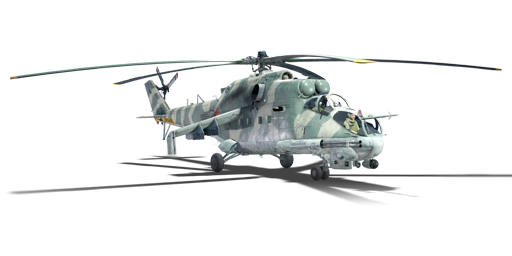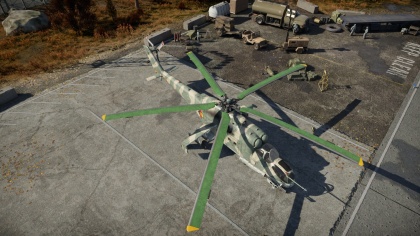Countermeasures
Contents
| This page is about the German attack helicopter Mi-24P (Germany). For other uses, see Mi-24 (Family). |
Description
The ◊Mi-24P is a rank VI German attack helicopter
with a battle rating of 10.0 (AB) and 9.7 (RB/SB). This helicopter was introduced in Update 1.83 "Masters of the Sea".
General info
Flight Performance
Describe how the aircraft behaves in the air. Maximum speed, manoeuvrability, speed and allowable loads - these are the most important characteristics of the vehicle.
| Characteristics | |||
|---|---|---|---|
| Stock | |||
| Max Speed (km/h at ?,000 m) |
Max altitude (meters) | ||
| AB | RB | ||
| ? | ? | 4950 | |
| Upgraded | |||
| Max Speed (km/h at ?,000 m) |
Max altitude (meters) | ||
| AB | RB | ||
| ? | ? | 4950 | |
Survivability and armour
Examine the survivability of the helicopter. Note how vulnerable the structure is and how secure the pilot is, how many engines the vehicle has. Describe the armour, if there is any, also mention the vulnerability of other critical aircraft systems.
Armaments
Offensive armament
Describe the offensive armament of the aircraft, if any. Describe how effective the cannons and machine guns are in a battle, and also what belts or drums are better to use. If there is no offensive weaponry, delete this subsection.
Suspended armament
Describe the aircraft's suspended armament: additional cannons under the wings, bombs, rockets and torpedoes. This section is especially important for bombers and attackers. If there is no suspended weaponry remove this subsection.
Usage in battles
Describe the tactics of playing in the helicopter, the features of using vehicles in a team and advice on tactics. Refrain from creating a "guide" - do not impose a single point of view but give the reader food for thought. Examine the most dangerous enemies and give recommendations on fighting them. If necessary, note the specifics of the game in different modes (AB, RB, SB).
Pros and cons
Summarize and briefly evaluate the vehicle in terms of its characteristics and combat effectiveness. Mark its pros and cons in the bulleted list. Try not to use more than 6 points for each of the characteristics. Avoid using categorical definitions such as "bad", "good" and the like - they have a substitution in the form of softer "inadequate", "effective".
Pros:
Cons:
History
Describe the history of the creation and combat usage of the helicopter in more detail than in the introduction. If the historical reference turns out to be too big, take it to a separate article, taking a link to an article about the vehicle and adding a block "/ History" (example: https://wiki.warthunder.com/(Vehicle-name)/History) and add a link to it here using the main template. Be sure to reference text and sources by using <ref>, as well as adding them at the end of the article.
Media
An excellent addition to the article will be video guides, as well as screenshots from the game and photos.
See also
Links to the articles on the War Thunder Wiki that you think will be useful for the reader, for example:
- reference to the series of the aircraft;
- links to approximate analogues of other nations and research trees.
External links
Paste links to sources and external resources, such as:
- topic on the official game forum;
- encyclopedia page on helicopter;
- other literature.
| Germany helicopters | |
|---|---|
| Attack | |
| Hip | ◊Mi-8TB |
| Hind | ◊Mi-24P · ◄Mi-24P HFS 80 |
| Tiger | EC-665 Tiger UHT |
| Utility | |
| BO 105 | BO 105 CB-2 · BO 105 PAH-1 · BO 105 PAH-1A1 |
| Alouette | ◄SA 313B Alouette II |
| Huey | ◄UH-1D |
Countermeasures are systems that allow a vehicle to counter a threat or defeat targeting systems.
Types of countermeasure
- Flares
- Flares are infrared countermeasures fired off by aircraft to counter infrared homing (heat-seeking) missiles. A flare is considered a decoy, depending on the material it is made from to either burn as hot or hotter than the aircraft's exhaust in an attempt to cause the missile to target it. Typically flares are fired off in multiples to increase chances of distracting the incoming missile from its intended target. Some aircraft have access to "large calibre" flares, which are individually more effective than normal flares at the expense of being able to carry fewer of them.
- Chaff
- Chaff refers to clouds of fibres (often metal or plastic) released by aircraft to create false radar signatures. The signals reflect off the chaff, causing new decoy signatures to appear on radar, which can cause an active radar lock to switch to tracking them instead and disguise the real target in their midst. Some aircraft have access to "large calibre" chaff, which are individually more effective than normal chaff at the expense of being able to carry fewer releases. Note that chaff is typically ineffective against pulse-Doppler radars, as it slows down extremely quickly once released and can thus be filtered out by the radar (much like ground clutter).
- MAW
- Missile Approach Warning will detect a missile launch and inform you about it. Some vehicles can dispense flares or chaff automatically when the MAW detects a missile.
- IRCM
- Infrared countermeasures include light energy emitted from non-coherent flashlamps and direct it towards an incoming missile in an attempt to blind the missile's infrared sensors. Low-powered infrared carrier signals emitted from the flashlamps flood the missile's infrared receivers and "confuse" the missile and cause it to follow a false target or a high-powered infrared carrier will blind the missile causing it to lose its target lock.
- DIRCM
- Directional Infrared Countermeasures uses laser emitted from a gimbaled base and direct the beam at incoming infrared homing missiles to effectively disrupt their tracking. This system is much more reliable and effective than the regular IRCM systems in-game.
- HIRSS
- Hover Infrared Suppressor System is a helicopter-specific modification that allows it to reduce or almost eliminate all infrared radiation emitted by exhaust gases to the surroundings, especially the helicopter body itself. "Hot spots" on a helicopter caused by the operating engine or the engine exhaust when directed onto the helicopter or helicopter body causes the infrared target of the helicopter to become larger and easier for infrared missiles to lock onto. Changes in the helicopter body to dissipate this infrared energy away from the helicopter reduces the infrared signature of the helicopter making infrared locks less effective and the usage of flares and IRCM more effective.
Media
- Videos





